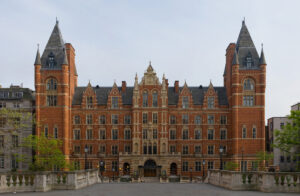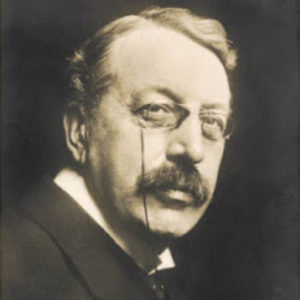Stanford the Conductor
The area of Stanford’s career that has probably received the least attention is his work as a conductor. This started during his time with the Cambridge University Musical Society and continued with the Choir of Trinity College, Cambridge, the Bach Choir in London, the Royal College of Music Orchestra and Opera Course and the Leeds Philharmonic Society and Leeds Festival. In addition, he conducted many of the first performances of his own compositions and made regular appearances as a guest conductor both in the UK and in Europe.
A book entitled The Royal College of Music and its Contexts by David C. H Wright, focuses on the history of the RCM and has a significant amount of space devoted to the early decades of the RCM when Stanford was conductor of the RCM Orchestra and Opera Course. This has recently been published in paperback by the Cambridge University Press at a very reasonable price and is well worth reading.
Stanford did not teach conducting at the RCM as no course in conducting was offered during his time there. But for thirty-seven years he conducted the College Orchestra and Opera Class in a very wide range of repertoire, most of which he chose, and he directed many well reviewed public concerts of the College Orchestra and opera performances. He encouraged his composition students to play in the College Orchestra and to attend as many concerts as they could. Several of his students and orchestral players such as Leopold Stokowski, Eugene Goossens, Vaughan Williams, Coleridge-Taylor, Bridge and Holst became quite successful conductors.
We have a tendency to judge conductors from their performance on the podium (and today from their recordings). However, more than ninety-five percent of the work of a conductor involves rehearsing and preparing his or her orchestra and choir. We know that Stanford was very thorough in his preparation. Just as in his composing he had a clear idea of what he wanted to do and put pen to paper with very few corrections, in his conducting he appears to have had a clear view of each work he was conducting and of how to prepare the orchestra and choir for performance.
Wright quotes J. A. Fuller Maitland one of Stanford’s Cambridge contemporaries describing Stanford’s conducting: “ In those early days Stanford’s style of conducting could not be accused of apathy. It was in sharp contrast to the ‘Kid Gloved ‘ manner then in vogue, as practiced by Cusins, Otto Goldschmidt , Sullivan and many others, who as far as the audience were concerned seemed to confine themselves to beating time. Stanford gave each instrument and voice in the chorus clear indications of when to come in; he was alert and animated and his gestures were eloquent. It was not till long after this that he altered his way of conducting, again as a protest, this time against the acrobatic style that was coming into fashion. He took the view that the conductor’s proper role was confined to the players and singers and not at all meant to impress the audience with an idea of his agility. Those who played under him know well that his methods were as thorough in the orchestra as they were in the teaching of composition, where he was without rival in Europe”.
In his biography of Stanford, Paul Rodmell quotes Marion Scott who was one of Stanford’s first female composition students and played the violin in the College Orchestra under him, as saying “ He always conveyed clearly what he wanted, and that without strain to himself or fuss to the players…..Ordinarily when conducting Stanford’s face was inexpressive. But there came times when in some passage of a noble work the beauty of the music seemed to rouse him to a passion of high love and reverence; then the hidden fires glowed in his look.”
Sadly, we have very few recordings made by Stanford. The Pearl Label has transferred all of the 78s that Stanford recorded. These were issued on LP in 1974 (Pearl GEM123 ). The Dutton Label released Stanford’s recording of Songs of the Fleet on CD in improved sound in 2007: (Dutton CDBP 9777 ). The archives of Columbia Records indicate that Stanford also made a recording of his choral work, Songs of the Sea in 1916, but this appears not to have been released and the masters destroyed.
There is much more research to be done to fully evaluate Stanford’s extensive work as a conductor during his long career. Hopefully this will be undertaken during the next few years.


